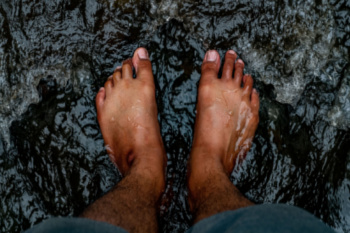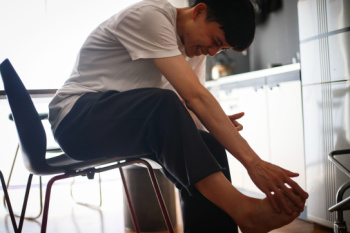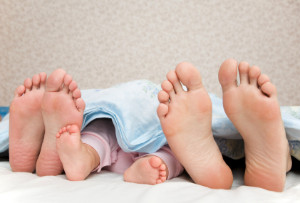





 Ingrown toenails, a painful condition where the toenail grows into the surrounding skin, can be managed through a range of treatments depending on severity. Initially, a podiatrist may use conservative approaches, such as soaking the foot in warm water, gently placing cotton underneath the nail to help the nail grow above the skin, and using antibiotic creams. If these methods do not provide relief or if the ingrown toenail grows back, other treatments may be necessary. Podiatrists often perform a minor procedure where part of the nail is removed to prevent it from growing into the skin again. Podiatrists can also perform a minor surgical procedure that involves removing a portion of the nail along with the underlying tissue to reduce the nail's width and prevent future ingrown issues. These treatments aim to relieve pain, correct nail growth, and prevent infection. If you are struggling with an ingrown toenail, it is suggested that you seek help from a podiatrist.
Ingrown toenails, a painful condition where the toenail grows into the surrounding skin, can be managed through a range of treatments depending on severity. Initially, a podiatrist may use conservative approaches, such as soaking the foot in warm water, gently placing cotton underneath the nail to help the nail grow above the skin, and using antibiotic creams. If these methods do not provide relief or if the ingrown toenail grows back, other treatments may be necessary. Podiatrists often perform a minor procedure where part of the nail is removed to prevent it from growing into the skin again. Podiatrists can also perform a minor surgical procedure that involves removing a portion of the nail along with the underlying tissue to reduce the nail's width and prevent future ingrown issues. These treatments aim to relieve pain, correct nail growth, and prevent infection. If you are struggling with an ingrown toenail, it is suggested that you seek help from a podiatrist.
Ingrown toenails can become painful if they are not treated properly. For more information about ingrown toenails, contact one of our podiatrists of Active Foot and Ankle Care, LLC. Our doctors can provide the care you need to keep you pain-free and on your feet.
Ingrown Toenails
Ingrown toenails occur when a toenail grows sideways into the bed of the nail, causing pain, swelling, and possibly infection.
Causes
Prevention
Because ingrown toenails are not something found outside of shoe-wearing cultures, going barefoot as often as possible will decrease the likeliness of developing ingrown toenails. Wearing proper fitting shoes and using proper cutting techniques will also help decrease your risk of developing ingrown toenails.
Treatment
Ingrown toenails are a very treatable foot condition. In minor cases, soaking the affected area in salt or antibacterial soaps will not only help with the ingrown nail itself, but also help prevent any infections from occurring. In more severe cases, surgery is an option. In either case, speaking to your podiatrist about this condition will help you get a better understanding of specific treatment options that are right for you.
If you have any questions please feel free to contact our offices located in Fair Lawn, Riverdale, and Englewood, NJ . We offer the newest diagnostic and treatment technologies for all your foot and ankle needs.

Hammertoe is a deformity of the second, third, or fourth toe that causes a bend at the middle joint so that it resembles a hammer. A hammertoe can significantly affect mobility and cause discomfort, especially while wearing shoes. Conservative treatment measures include wearing proper footwear and orthotics, but more severe cases may necessitate surgical intervention which carries certain risks. Post-operative complications may include pain, swelling, and difficulty in weight bearing. Nerve damage leading to sensations of numbness or tingling, reduced range of motion in the toe, and the risk of infection at the surgical site are further risk factors. Additionally, there is a possibility of the toe not sitting completely flat on the ground after surgery, which can affect balance and mobility. To determine the best course in managing a hammertoe, it is suggested that you schedule an appointment with a podiatrist to find out if surgery is right for you.
Foot surgery is sometimes necessary to treat a foot ailment. To learn more, contact one of our podiatrists of Active Foot and Ankle Care, LLC. Our doctors will assist you with all of your foot and ankle needs.
When Is Surgery Necessary?
Foot and ankle surgery is generally reserved for cases in which less invasive, conservative procedures have failed to alleviate the problem. Some of the cases in which surgery may be necessary include:
What Types of Surgery Are There?
The type of surgery you receive will depend on the nature of the problem you have. Some of the possible surgeries include:
Benefits of Surgery
Although surgery is usually a last resort, it can provide more complete pain relief compared to non-surgical methods and may allow you to finally resume full activity.
Surgical techniques have also become increasingly sophisticated. Techniques like endoscopic surgery allow for smaller incisions and faster recovery times.
If you have any questions please feel free to contact our offices located in Fair Lawn, Riverdale, and Englewood, NJ . We offer the newest diagnostic and treatment technologies for all your foot and ankle needs.

Gout, an inflammatory ailment caused by excess uric acid, often triggers sudden and severe joint pain. Commonly affecting the big toe, gout attacks are often described as feeling like a fracture or a severe burn. Along with the intense pain, symptoms include visible swelling, redness, and inflammation in the affected joint, making movement difficult and leading to stiffness. These symptoms tend to worsen over time if left untreated, potentially causing joint deformity and long-term complications. Recurrent gout attacks can occur in clusters, affecting both mobility and overall quality of life. Seeking professional help from a podiatrist is essential for comprehensive care, including diagnosis, treatment, and long-term management. Podiatrists can offer a combination of medication, lifestyle adjustments, and preventive strategies to alleviate gout symptoms and reduce the risk of future attacks. If you experience such painful symptoms, particularly in your big toe, it is suggested that you are under the care of a podiatrist for treatment.
Gout is a painful condition that can be treated. If you are seeking treatment, contact one of our podiatrists from Active Foot and Ankle Care, LLC. Our doctors will treat your foot and ankle needs.
What Is Gout?
Gout is a form of arthritis that is characterized by sudden, severe attacks of pain, redness, and tenderness in the joints. The condition usually affects the joint at the base of the big toe. A gout attack can occur at any random time, such as the middle of the night while you are asleep.
Symptoms
Risk Factors
Prior to visiting your podiatrist to receive treatment for gout, there are a few things you should do beforehand. If you have gout you should write down your symptoms--including when they started and how often you experience them, important medical information you may have, and any questions you may have. Writing down these three things will help your podiatrist in assessing your specific situation so that he or she may provide the best route of treatment for you.
If you have any questions, please feel free to contact our offices located in Fair Lawn, Riverdale, and Englewood, NJ . We offer the newest diagnostic and treatment technologies for all your foot care needs.

Studies show that carrying extra weight puts a significant amount of pressure on the feet, leading to various issues. For instance, overweight individuals are more likely to experience general foot pain and especially discomfort in the bottom of the heels when walking. Additionally, their feet might appear flatter, and they may have difficulty moving them as freely as they should. This is because extra weight can alter the foot's mechanics, causing it to roll inward more during walking. Furthermore, it is important to note that it is not just about the overall weight but also where the body stores fat. Excess fat, particularly around the feet, can increase foot pain. A podiatrist can offer personalized strategies to alleviate discomfort and improve foot function. If you are experiencing foot problems that may be connected to your weight, it is suggested that you schedule an appointment with a podiatrist for help.
Obesity has become very problematic at this point in time and can have extremely negative effects on the feet. If you’re an obese individual and are concerned about your feet, contact one of our podiatrists from Active Foot and Ankle Care, LLC. Our doctors can provide the care you need to keep you pain-free and on your feet.
Obesity and Your Feet
Since your feet are what support your entire weight when standing, any additional weight can result in pain and swelling. Being overweight is one of the main contributors to foot complications.
Problems & Complications
Extra Weight – Even putting on just a few extra pounds could create serious complications for your feet. As your weight increases, your balance and body will shift, creating new stresses on your feet. This uneven weight distribution can cause pain, even while doing the simplest tasks, such as walking.
Diabetes – People who are overweight are at serious risk of developing type-2 diabetes, which has a drastic impact on the health of your feet. As you get older, your diabetes might worsen, which could lead to loss of feeling in your feet, sores, and bruises. You could also become more prone to various infections.
Plantar fasciitis – Pressure and stress that is placed on muscles, joints, and tendons can trigger plantar fasciitis, which is an inflammation of tissue that forms along the bottom of the foot.
If you have any questions please feel free to contact our offices located in Fair Lawn, Riverdale, and Englewood, NJ . We offer the newest diagnostic and treatment technologies for all your foot and ankle needs.
 Children's foot and heel pain, or CFHP, encompasses a variety of conditions that can impact children’s ability to engage in activities and sports without discomfort. One common cause of CFHP is Sever's disease, a condition that results from inflammation of the growth plate in the heel. Sever’s disease is often seen in active children undergoing growth spurts. Additionally, flat feet or overpronation can strain the foot's muscles and ligaments, causing pain. Improper footwear, intense physical activity, and obesity may also contribute to the development of CFHP. Symptoms typically include pain in the foot or heel, particularly during or after physical activities, and might be accompanied by swelling or redness. Addressing CFHP involves a combination of rest, wearing appropriate footwear, and sometimes orthotic devices to support the foot's structure. Early diagnosis and treatment are important to prevent chronic problems and ensure that children can participate in their favorite activities without pain. If your child is suffering with foot or heel pain, it is suggested that you schedule an appointment with a podiatrist today.
Children's foot and heel pain, or CFHP, encompasses a variety of conditions that can impact children’s ability to engage in activities and sports without discomfort. One common cause of CFHP is Sever's disease, a condition that results from inflammation of the growth plate in the heel. Sever’s disease is often seen in active children undergoing growth spurts. Additionally, flat feet or overpronation can strain the foot's muscles and ligaments, causing pain. Improper footwear, intense physical activity, and obesity may also contribute to the development of CFHP. Symptoms typically include pain in the foot or heel, particularly during or after physical activities, and might be accompanied by swelling or redness. Addressing CFHP involves a combination of rest, wearing appropriate footwear, and sometimes orthotic devices to support the foot's structure. Early diagnosis and treatment are important to prevent chronic problems and ensure that children can participate in their favorite activities without pain. If your child is suffering with foot or heel pain, it is suggested that you schedule an appointment with a podiatrist today.
The health of a child’s feet is vital to their overall well-being. If you have any questions regarding foot health, contact one of our podiatrists of Active Foot and Ankle Care, LLC. Our doctors can provide the care you need to keep you pain-free and on your feet.
Tips for Keeping Children's Feet Healthy
If you have any questions, please feel free to contact our offices located in Fair Lawn, Riverdale, and Englewood, NJ . We offer the newest diagnostic and treatment technologies for all your foot care needs.






